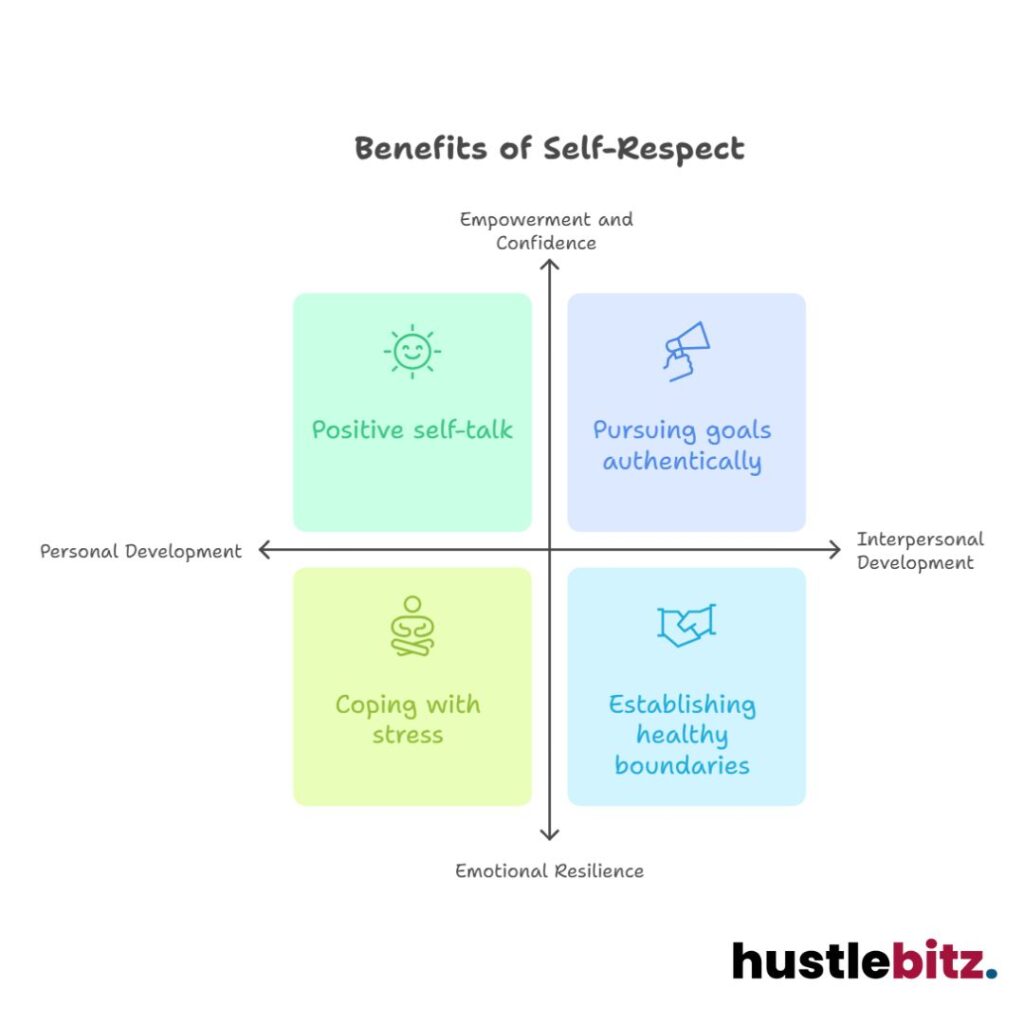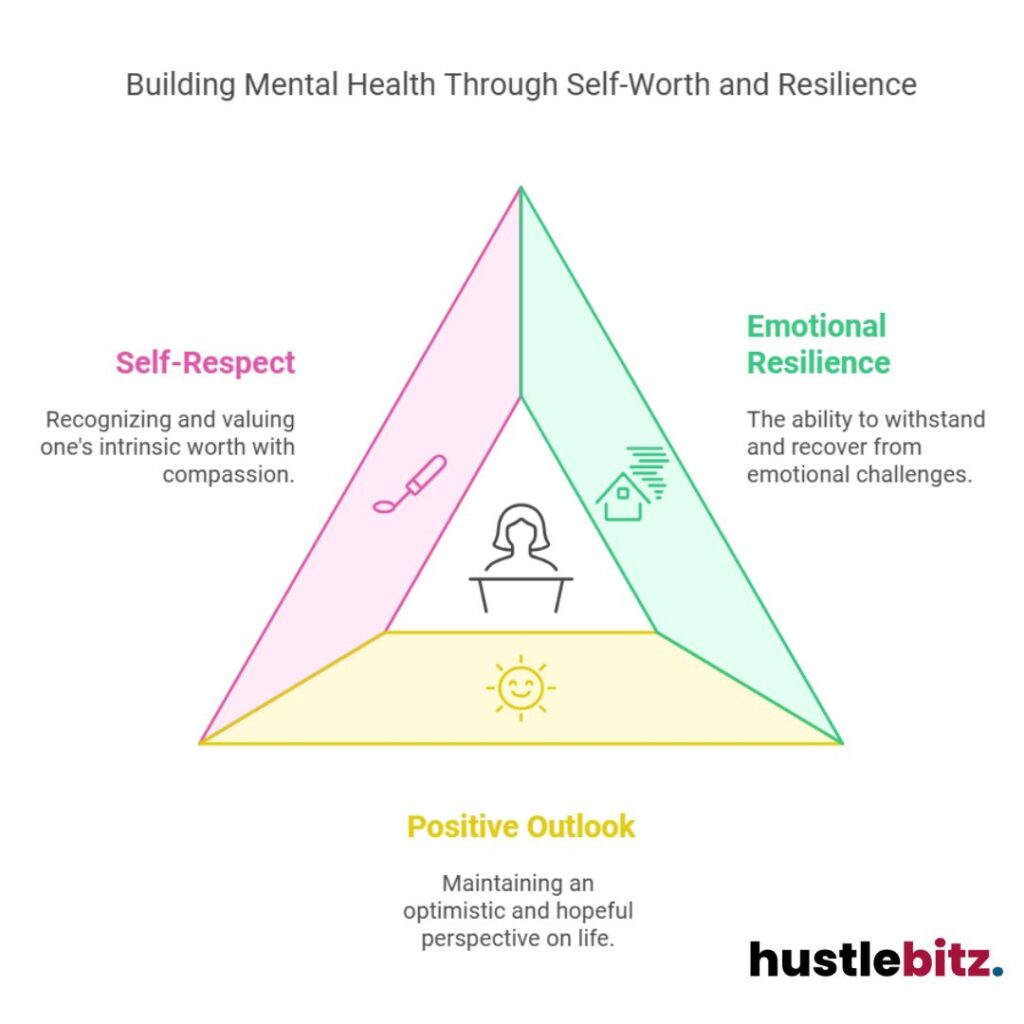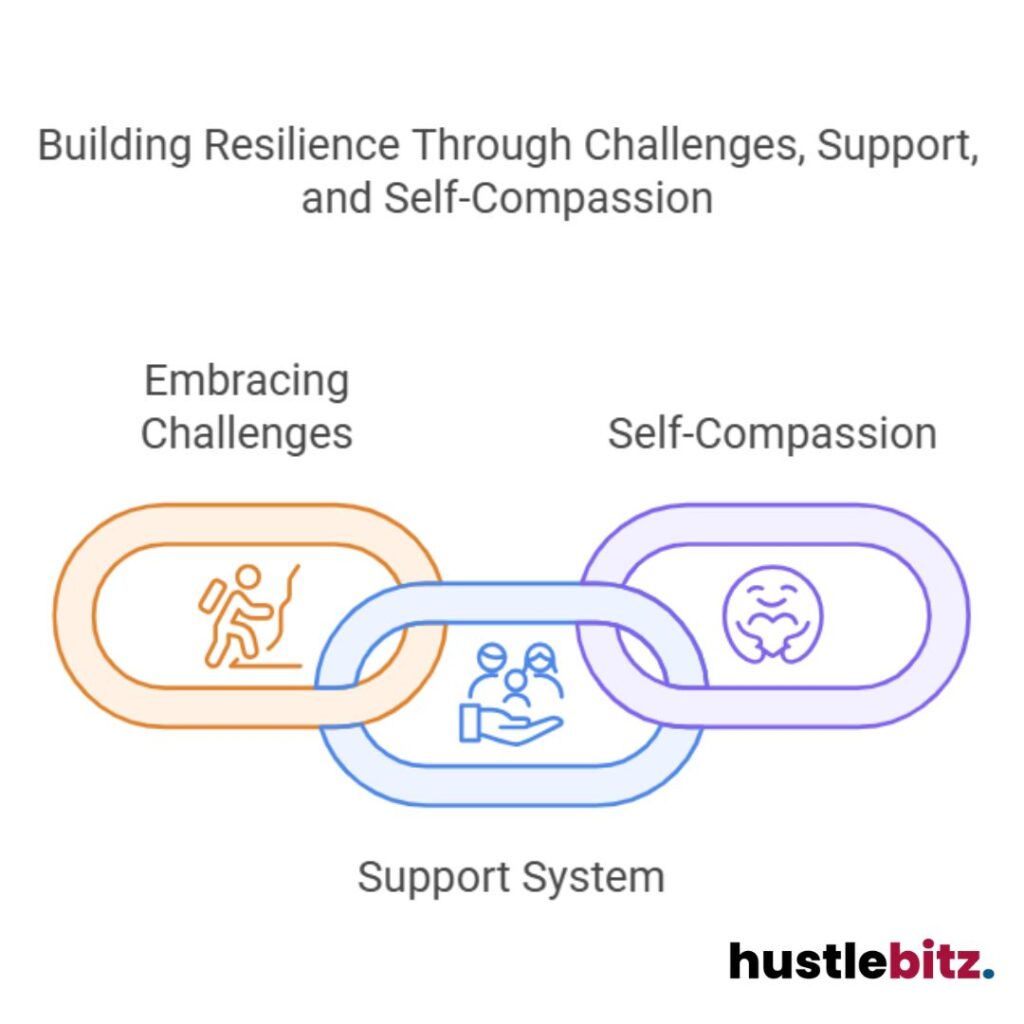Self-respect plays a crucial role in enhancing your life and well-being. It establishes a strong sense of identity, fostering emotional resilience and empowering individuals to set healthy boundaries. This promotes better relationships and improves decision-making by aligning choices with personal values. With high self-respect, individuals experience boosted confidence and self-esteem, further nurturing their mental health. Additionally, self-respect encourages personal growth and helps develop coping mechanisms, making it easier to face challenges. Ultimately, cultivating self-respect leads to a more fulfilling life. Exploring these aspects can reveal even greater insights into how self-respect shapes your overall well-being.
Key Takeaways
- Self-respect fosters emotional resilience, enabling individuals to cope effectively with stressors and maintain a positive outlook on life.
- Establishing healthy boundaries through self-respect enhances interpersonal relationships and promotes mutual respect.
- High self-respect boosts confidence and self-esteem, empowering individuals to pursue their goals and aspirations authentically.
- Positive self-talk, rooted in self-respect, combats negative thoughts and nurtures a compassionate mindset towards oneself.
- A strong sense of self-worth encourages thoughtful decision-making aligned with personal values and principles.

Understanding Self-Respect

Self-respect is a fundamental aspect of personal identity that encompasses an individual’s recognition of their own worth and dignity. It serves as the foundation for self-acceptance, allowing individuals to acknowledge their strengths and weaknesses without undue self-criticism.
The importance of self-respect cannot be overstated, as it directly influences emotional well-being and interpersonal relationships. When individuals possess a strong sense of self-respect, they are more likely to engage in positive self-talk and cultivate a healthy self-image.
Establishing healthy boundaries is a crucial component of self-respect. By understanding and asserting personal limits, individuals protect their emotional and mental health. Healthy boundaries prevent the erosion of self-worth that can occur when one neglects their needs in favor of others.
This assertiveness not only fosters resilience but also enhances the quality of relationships, as it encourages mutual respect and understanding.
Furthermore, self-respect plays a vital role in decision-making processes. When individuals value themselves, they are more inclined to make choices that align with their principles and aspirations. This alignment promotes a sense of purpose and fulfillment, further contributing to emotional well-being.
Boosting Your Confidence

How can individuals effectively enhance their confidence and cultivate a more positive self-image? Boosting confidence is intrinsically linked to the concepts of self-esteem and self-worth. By actively engaging in building self-respect, individuals can create a strong foundation for a healthier self-image. This process begins with self-awareness, recognizing personal values and strengths, which can significantly elevate one’s self-esteem.
One effective method for enhancing confidence is the practice of positive affirmations. By consistently repeating affirmations that highlight personal strengths and accomplishments, individuals can rewire their thought processes, replacing negative self-talk with empowering messages. This shift not only reinforces self-worth but also fosters a mindset conducive to growth and resilience.
Additionally, setting and achieving small, realistic goals can significantly contribute to an individual’s confidence. Each accomplishment, no matter how minor, serves as a building block, reinforcing the belief in one’s abilities. As one accumulates these successes, the sense of self-worth becomes increasingly solidified.
Social interactions also play a vital role in boosting confidence. Surrounding oneself with supportive individuals who recognize and affirm one’s value can be transformative. Constructive feedback from trusted peers can encourage growth while reinforcing the belief in one’s potential.
Enhancing Mental Health
Cultivating a strong sense of self-worth can significantly enhance mental health by fostering emotional resilience and promoting a positive outlook on life. Healthy self-respect means recognizing one’s intrinsic value and treating oneself with compassion and understanding. This foundational belief can lead to improved mental and emotional health, as individuals who respect themselves are less likely to engage in self-destructive behaviors and more likely to seek positive experiences.

A key component of maintaining healthy self-respect is the practice of positive self-talk. By challenging negative thoughts and replacing them with affirming statements, individuals can cultivate a more optimistic mindset. This shift in thinking not only boosts self-esteem but also reinforces a sense of well-being, allowing individuals to navigate life’s challenges with greater ease. When people feel good about themselves, they are better equipped to cope with stressors, ultimately leading to a more balanced emotional state.
Moreover, fostering self-respect contributes to the development of emotional resilience. Individuals who possess a strong sense of self-worth are more likely to bounce back from setbacks and view them as opportunities for growth rather than insurmountable obstacles. This resilience can lead to a more fulfilling life, where individuals are empowered to pursue their goals and dreams.
Improving Decision-Making
A strong sense of self-worth not only enhances mental health but also plays a significant role in improving decision-making abilities. Individuals with high self-respect are more inclined to weigh their options thoughtfully and assert their needs and desires in various situations. This enhanced decision-making stems from a deep understanding of one’s values and priorities, allowing for choices that align with personal beliefs and emotional health.
The following factors illustrate how self-respect contributes to better decision-making:
- Clarity of Values: Individuals with self-respect have a clearer sense of what matters to them. This clarity helps in evaluating choices based on personal principles rather than external pressures or fleeting desires.
- Increased Confidence: With self-respect comes confidence in one’s judgments. This confidence allows individuals to make decisions without excessive doubt or second-guessing, leading to more decisive and effective outcomes.
- Resilience to Peer Pressure: A strong sense of self-worth equips individuals to resist negative influences from peers. When faced with challenging decisions, those with self-respect are more likely to stand firm in their beliefs, thereby promoting choices that support their mental and emotional health.
Fostering Personal Growth

Self-respect serves as a foundational pillar for fostering personal growth, empowering individuals to pursue their goals with authenticity and determination. When individuals cultivate self-respect, they create a conducive environment for personal development, which encompasses mental and emotional well-being. This inner strength enables them to embrace challenges, learn from experiences, and maintain a commitment to their aspirations.
The relationship between self-respect and personal growth is multifaceted. It often leads to healthier relationships, as individuals who respect themselves are more likely to establish boundaries and engage in mutually supportive interactions. These healthy relationships, in turn, further enhance overall well-being, creating a positive feedback loop that encourages continuous development.
To illustrate various aspects of fostering personal growth through self-respect, consider the following table:
| Aspect of Growth | Impact of Self-Respect | Outcome |
| Mental Well-Being | Improved self-awareness | Enhanced emotional resilience |
| Emotional Growth | Acceptance of personal flaws | Greater empathy towards others |
| Healthy Relationships | Establishing clear boundaries | Nurturing supportive connections |
| Goal Achievement | Motivation to pursue goals | Increased personal fulfillment |
Building Resilience

Resilience, closely linked to the foundation of self-respect, enables individuals to navigate life’s challenges with greater confidence and adaptability. When one cultivates self-respect, it inherently strengthens their sense of self-worth, which is crucial for fostering resilience. Each time individuals honor their values and beliefs, they reinforce their mental well-being, allowing them to face adversities with a balanced mindset.
Building resilience can be achieved through several key practices:
- Embracing Challenges: Viewing obstacles as opportunities for growth helps individuals develop a resilient mindset. Each challenge faced and overcome reinforces self-respect, further enhancing one’s ability to tackle future difficulties.
- Developing a Support System: Surrounding oneself with supportive relationships fosters a sense of connection and belonging. This network serves as a buffer during tough times, enabling individuals to draw strength from others while maintaining their self-respect.
- Practicing Self-Compassion: Recognizing that everyone experiences setbacks allows individuals to treat themselves with kindness rather than judgment. This practice nurtures self-respect and provides a solid foundation for resilience, as it encourages individuals to bounce back from failures with a renewed sense of self-worth.

Promoting Emotional Well-Being

Emotional well-being can be significantly enhanced when individuals prioritize their self-respect, as this foundation fosters a positive mindset and healthier coping mechanisms.
Self-respect is intrinsically linked to self-love, encouraging individuals to value their worth and engage in self-care practices that nurture their emotional health. This nurturing environment enables individuals to cultivate a positive self-image, which is essential for navigating life’s challenges with resilience.
When individuals respect themselves, they are more likely to set appropriate boundaries, communicate their needs effectively, and seek support from mental health professionals when necessary. This proactive approach not only improves emotional well-being but also creates a safety net that mitigates stress and anxiety. Recognizing and honoring one’s feelings allows for authentic emotional expression, which is vital for mental clarity and overall stability.
Moreover, self-respect acts as a catalyst for personal growth. By embracing their unique qualities and capabilities, individuals can develop a greater sense of purpose and fulfillment. This journey often leads to enhanced emotional well-being, as self-esteem and confidence flourish in an atmosphere of self-acceptance.
Ultimately, the interplay between self-respect, self-love, and emotional well-being is profound. By investing in self-care and fostering a positive self-image, individuals can create a resilient emotional landscape that supports their mental health journey. In this way, self-respect not only enhances individual well-being but also paves the way for deeper, more meaningful connections with others.
Final Thoughts
Cultivating self-respect is a powerful way to enhance every aspect of your life, from emotional resilience to decision-making and personal growth. By fostering a strong sense of self-worth, you equip yourself with the tools to navigate challenges confidently and maintain a positive outlook. Prioritizing self-respect not only improves your mental and emotional well-being but also strengthens your relationships and overall life satisfaction. Embrace the journey of self-respect, and watch how it transforms your life into one filled with fulfillment, purpose, and lasting well-being.




